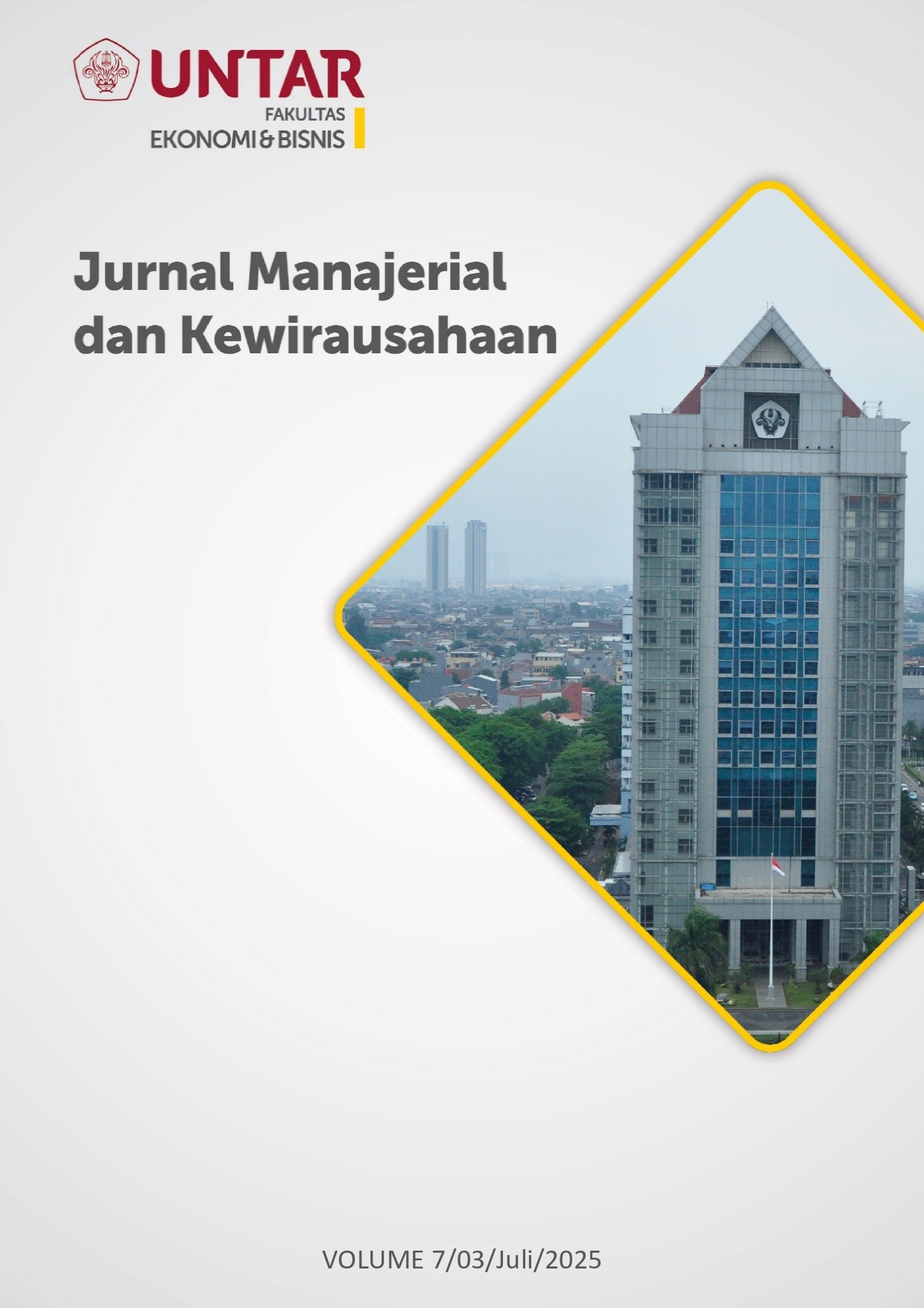Dimensi Family Entrepreneurial Orientation sebagai Mediator Pengaruh Entrepreneurial Education terhadap Entrepreneurial Intention
Main Article Content
Abstract
Penelitian ini bertujuan untuk menguji pengaruh entrepreneurship education terhadap entrepreneurial intention dengan dimensi family entrepreneurial orientation sebagai mediator. Dimensi yang diuji meliputi proactiveness, autonomy, competitive aggressiveness, dan professional autonomy. Data dikumpulkan melalui kuesioner pada mahasiswa semester akhir di universitas swasta yang berada di Jawa dan Bali, dan dianalisis menggunakan partial least squares structural equation modeling dengan smartpls 4.1.0.8. Hasil penelitian menunjukkan bahwa entrepreneurship education berpengaruh positif terhadap entrepreneurial intention, namun hanya competitive aggressiveness yang dapat memediasi hubungan antara entrepreneurship education dan entrepreneurial intention secara signifikan. Dimensi-dimensi family entrepreneurial orientation lainnya, yaitu proactiveness, autonomy, dan professional autonomy, tidak dapat memediasi atau memperkuat hubungan entrepreneurship education terhadap entrepreneurial intention. Penelitian ini menggunakan first-order measurement model. Temuan ini memberikan wawasan bahwa meskipun entrepreneurship education dapat meningkatkan entrepreneurial intention, dampak dari dimensi family entrepreneurial orientation sebagai mediator terbatas, terutama dengan competitive aggressiveness yang terbukti memiliki pengaruh signifikan. Penelitian ini juga menunjukkan bahwa dimensi lain dari family entrepreneurial orientation, seperti proactiveness, autonomy, dan professional autonomy, tidak secara efektif memediasi hubungan antara entrepreneurship education dan entrepreneurial intention, yang menunjukkan bahwa faktor keluarga dan family entrepreneurial orientation tidak selalu mendorong entrepreneurial intention di kalangan mahasiswa di indonesia.
This study aims to examine the effect of entrepreneurship education on entrepreneurial intention with the dimensions of family entrepreneurial orientation as mediators. The dimensions tested include proactiveness, autonomy, competitive aggressiveness, and professional autonomy. Data were collected through questionnaires from final-year students at private universities located in java and bali, and analyzed using partial least squares structural equation modeling with smartpls 4.1.0.8. The results show that entrepreneurship education has a positive effect on entrepreneurial intention, but only competitive aggressiveness significantly mediates the relationship between entrepreneurship education and entrepreneurial intention. Other dimensions of family entrepreneurial orientation, namely proactiveness, autonomy, and professional autonomy, do not mediate or strengthen the relationship between entrepreneurship education and entrepreneurial intention. This study uses a first-order measurement model. The findings provide insights that while entrepreneurship education can enhance entrepreneurial intention, the impact of family entrepreneurial orientation dimensions as mediators is limited, particularly with competitive aggressiveness proving to have a significant effect. This research also reveals that other dimensions of family entrepreneurial orientation, such as proactiveness, autonomy, and professional autonomy, do not effectively mediate the relationship between entrepreneurship education and entrepreneurial intention, indicating that family factors and family entrepreneurial orientation do not always drive entrepreneurial intention among students in indonesia.
Article Details
Section

This work is licensed under a Creative Commons Attribution-NonCommercial-ShareAlike 4.0 International License.
This work is licensed under a Jurnal Muara Ilmu Ekonomi dan Bisnis Creative Commons Attribution-ShareAlike 4.0 International License.,/p>
References
Cordier, I., & Bade, M. (2023). The relationship between business regulation and nascent and young business entrepreneurship revisited. Small Business Economics, 61(2), 587–616. https://doi.org/10.1007/s11187-022-00707-5
Frunzaru, V., & Cismaru, D. M. (2018). The impact of individual entrepreneurial orientation and education on generation Z’s intention towards entrepreneurship. Kybernetes, 50(7), 1969–1981. https://doi.org/10.1108/K-05-2018-0272
Hair, J. F., Hult, G. T. M., Ringle, C. M., Sarstedt, M., Danks, N. P., & Ray, S. (2021). partial least squares structural equation modeling (PLS-SEM) using R. springer.
Hair, Marko Sarstedt, & Christian M. Ringle. (2017). Partial Least Squares Structural Equation Modeling. springer.
Lumpkin, G. T., & Dess, G. G. (1996). Clarifying the Entrepreneurial Orientation Construct and Linking It to Performance. In Source: The Academy of Management Review (Vol. 21, Issue 1).
Nuringsih, K., & Edalmen, E. (2024). Development of instruments for sustainable entrepreneurial activities: in the perceptions of entrepreneurship students. International Journal of Application on Economics and Business, 2(3), 2987–1972. https://doi.org/10.24912/ijaeb.v2i3.288-296
Patricia, P., & Silangen, C. (2016). The Effect of Entrepreneurship Education on Entrepreneurial Intention in Indonesia. DeReMa (Development Research of Management): Jurnal Manajemen, 11, 67. https://doi.org/10.19166/derema.v11i1.184
Tomski, P. (2014). Towards Family Entrepreneurial Orientation. The Construct, Dimensionality and Measurement. Journal of Intercultural Management, 6(3), 123–142. https://doi.org/10.2478/joim-2014-0024
Wijaya, A., & Nuringsih, K. (2024). Pengetahuan kewirausahaan, motivasi kewirausahaan, dan kreativitas dapat memengaruhi minat berwirausaha. Jurnal Manajerial dan Kewirausahaan, 6(2), 284-291. http://dx.doi.org/10.24912/jmk.v6i2.29831

